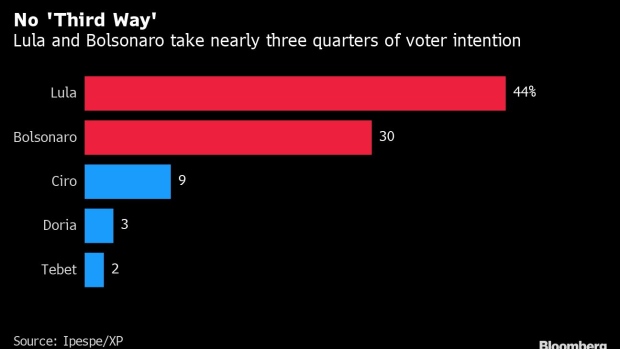Apr 6, 2022
Brazil Moderates Flop, Setting the Stage for Lula-Bolsonaro Showdown
, Bloomberg News

(Bloomberg) -- Moderate presidential candidates look increasingly far from posing a challenge to Brazil’s most polarizing political figures, Jair Bolsonaro and Luiz Inacio Lula da Silva, in the October elections.
With friendly fire and miscalculations, centrist presidential hopefuls are undermining long-shot efforts to give voters a “third way” -- an alternative to the nation’s right-wing and leftist front-runners. Six months before Brazilians go to the polls, opinion surveys show incumbent Bolsonaro, 67, and former President Lula, 76, capturing nearly three quarters of voter intention.
Bolsonaro garnered more support after former Judge Sergio Moro, who became a household name in Brazil while helming the wide-reaching Carwash corruption probe, suspended his candidacy last week. According to an Ipespe poll published on Wednesday, the president now has 30% of the vote, 4 percentage points more than in March and closing in on Lula, who remains the front-runner with 44%.
“The idea of a third-way candidate is more of a hope than a reality, we haven’t seen one really emerge,” said Carolina Botelho, a political scientist at the State University of Rio de Janeiro. “The names that have appeared have not been strong enough to win over voters, and what is clear is that it’s a very fragmented group.”
In Brazil, a candidate needs to take over 50% of the valid votes to win in a single round. Barring that, the front-runners compete head-to-head in a second and final round. Ipespe interviewed 1,000 people by telephone across Brazil between April 2 and 5, with a 3.2% margin of error.
Backfiring Strategy
Moro, who put Lula behind bars before the 2018 election and was later deemed biased against the ex-president by the nation’s top court, had been trailing the front-runners for months. He was neck and neck with Ciro Gomes, once the governor of Ceara state.
In a bid to boost his chances, the former judge decided to migrate to a bigger and richer party only to see his strategy backfire when leaders of that group blocked his candidacy last week.
Other third-way contenders are in a similarly difficult position.
The former governors of Sao Paulo and Rio Grande do Sul have intensified an intra-party fight to represent the Brazilian Social Democracy Party, or PSDB, in the October vote.
Joao Doria resigned from his post in the Sao Paulo government last week after winning party primaries, but Eduardo Leite is still eyeing a presidential run. He is in talks with Senator Simone Tebet, a prominent opponent of Bolsonaro, to become running mates in a potential alliance between their parties. Yet none have polled over 3% in recent surveys.
Some third-way candidates are in early-stage talks about coalescing on a single ticket, but there is little consensus on which names would appear on the ballot. Meanwhile, the presidential field appears to be polarizing further, with the front-runners well aware of their standing.
“Now in Brazil they are looking for a so-called third way,” Lula said in interview with a local radio on Tuesday. “Leadership isn’t something that’s learned at university.”
©2022 Bloomberg L.P.








